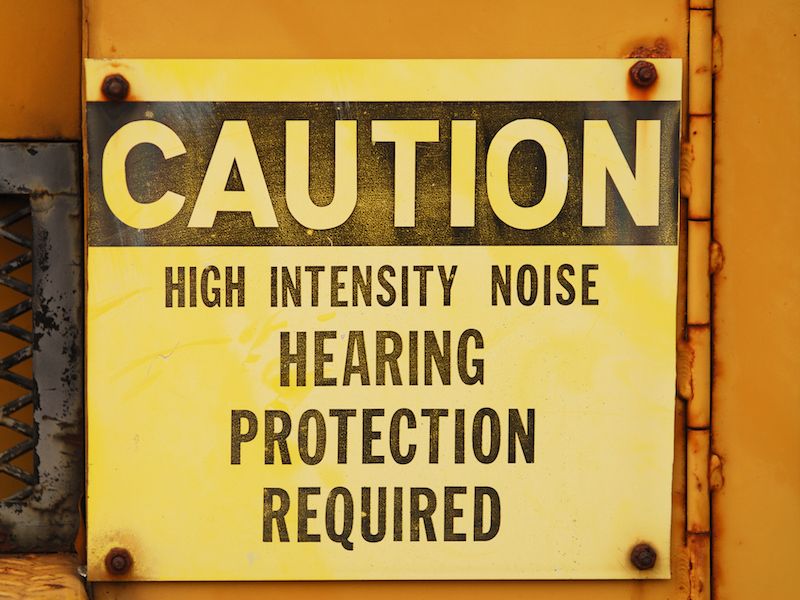It’s one thing to know that you need to protect your hearing. Recognizing when to safeguard your ears is a different story. It’s not as easy as, for example, knowing when to use sunscreen. (Are you going to go outdoors? Is the sun out? You need to be wearing sunblock.) Even knowing when you need eye protection is easier (Working with dangerous chemicals? Doing some building? You need eye protection).
It can feel as though there’s a huge grey area when dealing with when to use ear protection, and that can be dangerous. Unless we have specific knowledge that some place or activity is dangerous we tend to take the easy path which is to avoid the problem altogether.
Evaluating The Risks
In general, we’re not very good at assessing risk, especially when it comes to something as intangible as permanent hearing damage or loss of hearing. To prove the point, here are some examples:
- A very loud rock concert is attended by person A. The concert lasts roughly 3 hours.
- A landscaping business is run by person B. After mowing lawns all day, she goes home and quietly reads a book.
- Person C works in an office.
You may think the hearing hazard is higher for person A (let’s just call her Ann). Ann leaves the performance with ringing ears, and she’ll spend the majority of the next day, struggling to hear herself talk. It seems reasonable to assume that Ann’s activity was quite hazardous.
Person B (let’s call her Betty), on the other hand, is subjected to less noise. Her ears don’t ring. So it must be less hazardous for her hearing, right? Not necessarily. Because Betty is mowing all day. So despite the fact that her ears don’t ring out with pain, the injury builds up bit by bit. If experienced every day, even moderately loud noise can have a detrimental affect on your ears.
Person C (let’s call her Chris) is even less clear. Lawnmowers have instructions that point out the dangers of ongoing exposure to noise. But even though Chris works in a quiet office, she has a really noisy, hour-long commute every day on the train. Additionally, even though she works at her desk all day, she listens to her music through earbuds. Does she need to give some thought to protection?
When is it Time to Begin to Consider About Safeguarding Your Hearing?
The general rule of thumb is that if you have to raise your voice in order to be heard, your environment is noisy enough to do injure to your ears. And you should think about using earmuffs or earplugs if your surroundings are that noisy.
The cutoff should be 85dB if you want to get scientific. Noises above 85dB have the capacity to result in damage over time, so you should consider using ear protection in those situations.
Many hearing professionals recommend using a special app to keep track of decibel levels so you will be aware when the 85dB has been reached. These apps can show you when the surrounding sound is nearing a hazardous level, and you can take appropriate steps.
A Few Examples
Your phone might not be with you wherever you go even if you do download the app. So we might establish a good standard with a few examples of when to protect our ears. Here we go:
- Exercise: Your morning spin class is a perfect example. Or maybe your daily elliptical session. Each of these examples could call for hearing protection. Those trainers who make use of microphones and sound systems (and loud music) to motivate you might be good for your heart rate, but all that volume is bad for your hearing.
- Listening to music with earbuds. OK, this doesn’t require protection but does require caution. Give consideration to how loud the music is, how long you’re playing it, and whether it’s going directly into your ears. Noise-canceling headphones are a smart choice to avoid needing to turn the volume way up.
- Working With Power Tools: You know you will want hearing protection if you work every day in a factory. But how about the hobbyist building in his workshop? Most hearing specialists will suggest you wear hearing protection when working with power tools, even if it’s just on a hobbyist basis.
- Commuting and Driving: Driving all day as an Uber or Lyft driver? Or maybe you’re riding a subway after waiting for a little while downtown. The noise of living in the city is bad enough for your hearing, not to mention the extra damage caused by cranking up your tunes to drown out the city noise.
- Residential Chores: We already mentioned how something as simple as mowing the lawn, when done often enough, can necessitate hearing protection. Cutting the grass is a good example of the sort of household task that may cause damage to your hearing but that you probably don’t think about all that often.
A strong baseline may be researched by these examples. When in doubt, however, you should defer to protection. In the majority of cases, it’s better to over-protect your hearing than to leave them subject to possible injury in the future. If you want to be able to hear tomorrow, protect today.

